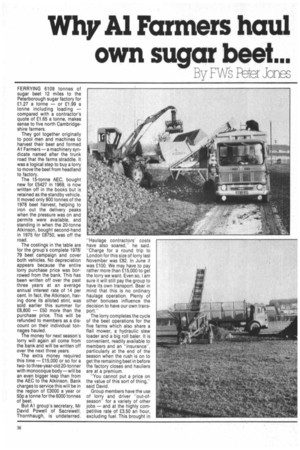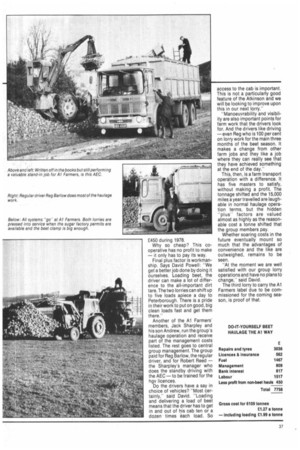Why Al Farmers haul own sugar beet...
Page 152

Page 153

If you've noticed an error in this article please click here to report it so we can fix it.
t-\AT Peter Jones t-\AT Peter Jones
FERRYING 6109 tonnes of sugar beet 12 miles to the Peterborough sugar factory for £1.27 a tonne — or £1.99 a tonne including loading — compared with a contractor's quote of £1.65 a tonne, makes sense to five north Cambridgeshire farmers.
They got together originally to pool men and machines to harvest their beet and formed Al Farmers — a machinery syndicate named after the trunk road that the farms straddle. It was a logical step to buy a lorry to move the beet from headland to factory.
The 15-tonne AEC, bought new for £5427 in 1969, is now written off in the books but retained as the standby vehicle. It moved only 900 tonnes of the 1978 beet harvest, helping to iron out the delivery peaks when the pressure was on and permits were available, and standing in when the 20-tonne Atkinson, bought second-hand in 1975 for £8750, was off the road.
The costings in the table are for the group's complete 1978: 79 beet campaign and cover both vehicles. No depreciation appears because the entire lorry purchase price was borrowed from the bank. This has been written off over the past three years at an average annual interest rate of 14 per cent. In fact, the Atkinson, having done its alloted stint, was sold earlier this summer for £8,800 — £50 more than the purchase price. This will be refunded to members as a discount on their individual tonnages hauled.
The money for next season's lorry will again all come from the bank, and will be written off over the next three years.
The extra money required this time — £15,000 or so for a twoto three-year-old 20-tonner with monocoque body— will be an even bigger leap than from the AEC to the Atkinson. Bank charges to service this will be in the region of £3000 a year or 50p a tonne for the 6000 tonnes of beet.
But Al group's secretary, Mr David Powell of Sacrewell. Thornhaugh, is undeterred.
-Haulage contractors costs have also soared,he said. "Charge for a round trip to London for this size of lorry last November was £82. In June it was 2100. We may have to pay rather more than £15,000 to get the lorry we want. Even so, I am sure it will still pay the group to have its own transport. Bear in mind that this is no ordinary haulage operation. Plenty of other bonuses influence the decision to have our own transport.'' The lorry completes the cycle of the beet operations for the five farms which also share a flail mower, a hydraulic slew loader and a big roll baler. It is convenient, readily available to members and an -insurance'', particularly at the end of the season when the rush is on to get the remaining beet in before the factory closes and hauliers are at a premium.
"You cannot put a price on the value of this sort of thing," said David.
Group members have the use of lorry and driver -out-ofseasonfor a variety of other jobs — and at the highly competitive rate of £3.50 an hour, excluding fuel. This brought in
£450 during 1978.
Why so cheap? This cooperative has no profit to make — it only has to pay its way.
Final plus factor is workmanship. Says David Powell: "We get a better job done by doing it ourselves. Loading beet, the driver can make a lot of difference to the all-important dirt tare. The two lorries can shift up to five loads apiece a day to Peterborough. There is a pride in their work to put on good, big clean loads fast and get them there."
Another of the Al Farmers' members, Jack Sharpley and his son Andrew, run the group's haulage operation and receive part of the management costs listed. The rest goes to central group management. The group paid for Reg Barlow, the regular driver, and for Robert Reed — the Sharpley's manager who does the standby driving with the AEC — to be trained for the hgv licences.
Do the drivers have a say in choice of vehicles? "Most certainly," said David. "Loading and delivering a load of beet means that the driver has to get in and out of his cab ten or a dozen times each load. So access to the cab is important. This is not a particularly good feature of the Atkinson and we will be looking to improve upon this in our next lorry."
"Manoeuvrability and visibility are also important points for farm work that the drivers look for. And the drivers like driving --even Reg who is 100 per cent on lorry work for the main three months of the beet season. It makes a change from other farm jobs and they like a job where they can really see that they have achieved something at the end of the day."
This, then, is a farm transport operation with a difference. It has five masters to satisfy, without making a profit. The tonnage shifted and the 15,000 miles a year travelled are laughable in normal haulage operation terms, but the hidden "plus" factors are valued almost as highly as the reasonable cost a tonne shifted that the group members pay.
Whether soaring costs in the future eventually mount so much that the advantages of convenience and the like are outweighed, remains to be seen, "At the moment we are well satisfied with our group lorry operations and have no plans to change," said David.
The third lorry to carry the Al Farmers label due to be commissioned for the coming season, is proof of that.




























































































































































